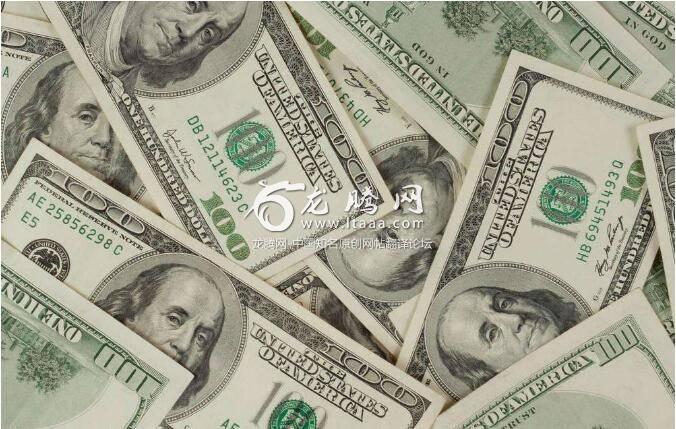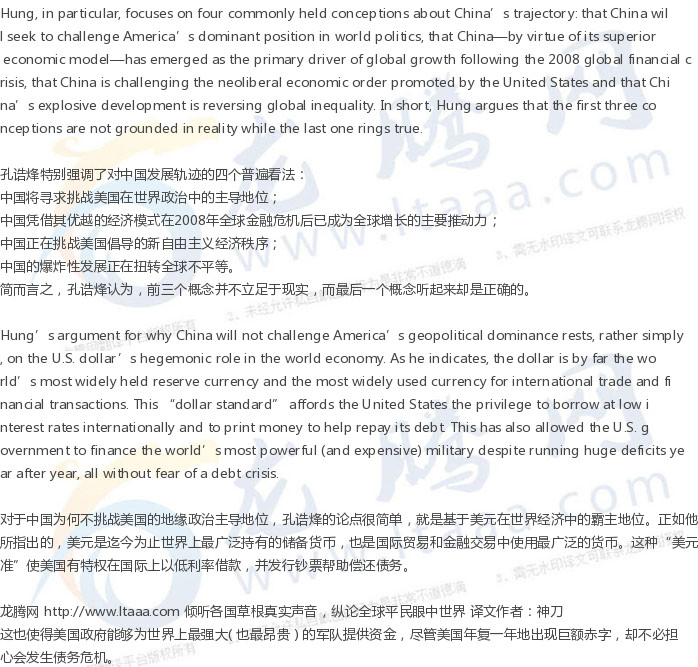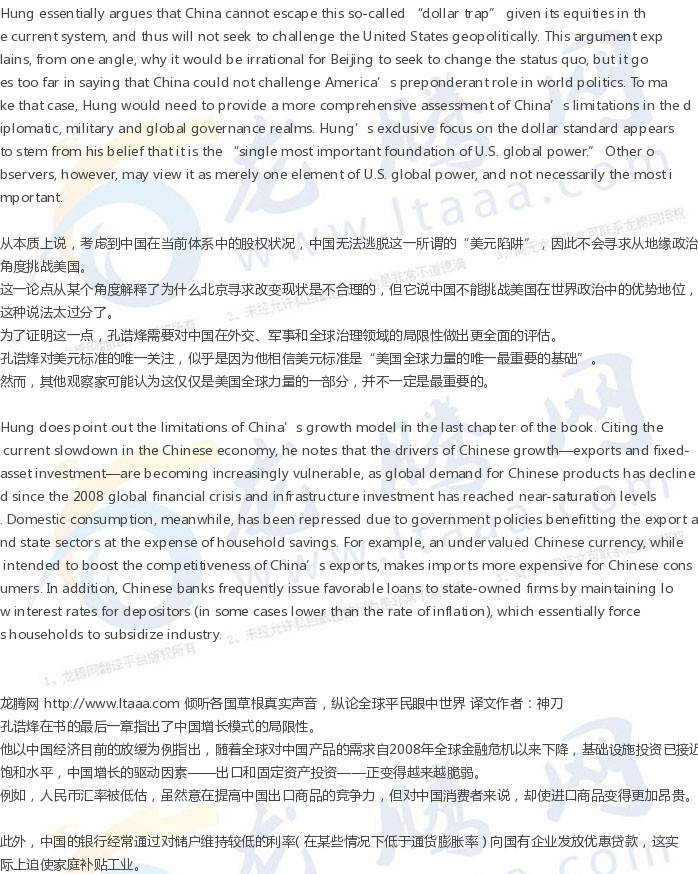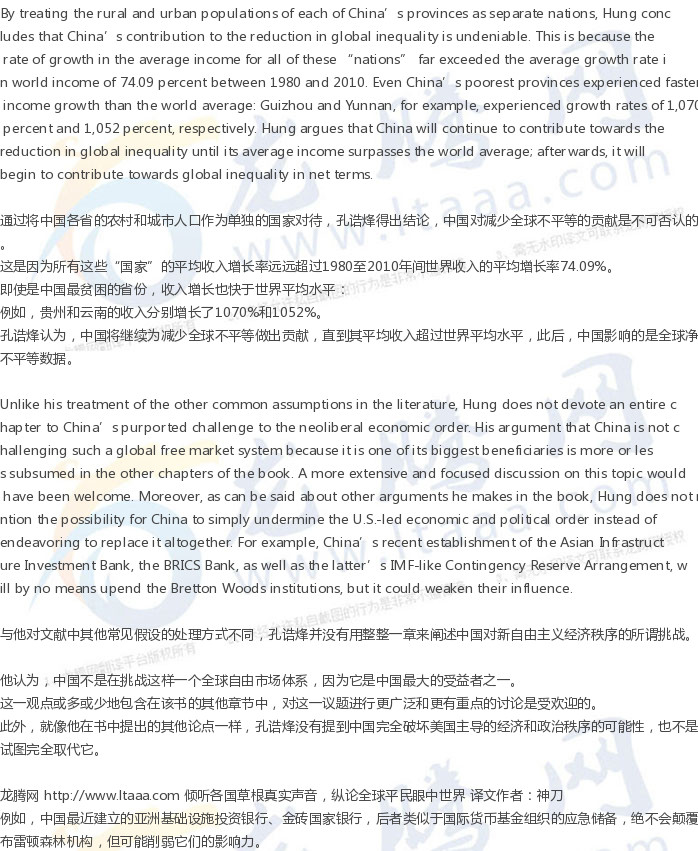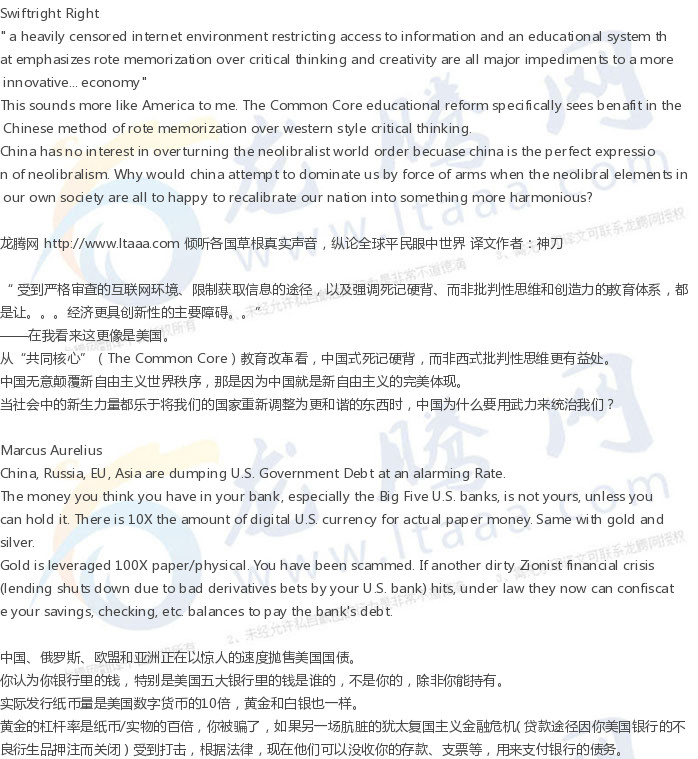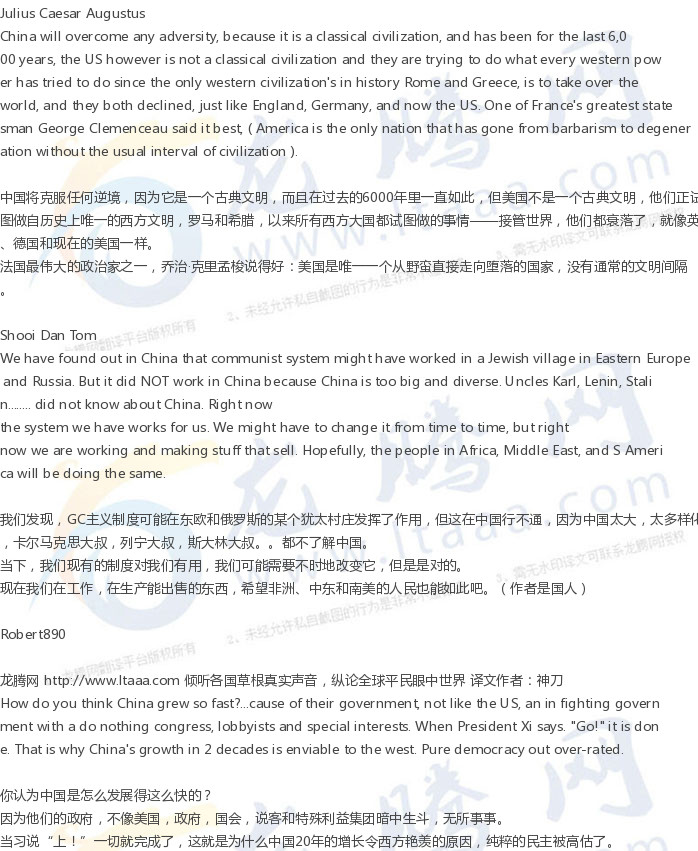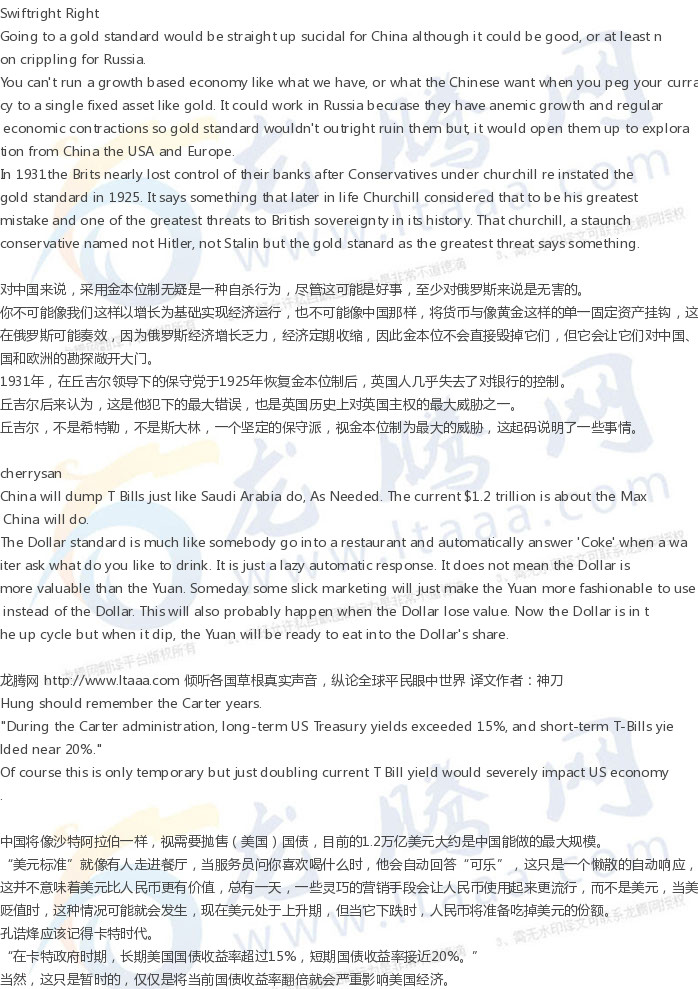中国的地缘政治崛起能克服“美元陷阱”吗? [美国媒体]
中国的崛起刺激了一批宣扬中国经济模式的优越性,以及随之而来的西方衰落的书籍产业。
Can Beijing's geopolitical rise overcome the"dollar trap"?
中国的地缘政治崛起能克服 “美元陷阱” 吗?
by Kyle Churchman
作者:凯尔·丘克曼
China’s rise has spurred a cottage industry of books proclaiming the superiority of the Chinese economic model and the concomitant decline of the West. The most notable example is Martin Jacques’ 2010 best seller When China Rules the World: The End of the Western World and the Birth of a New Global Order . Johns Hopkins sociology professor Ho-fang Hung provides another welcome corrective to such exaggerated narratives in The China Boom: Why China Will Not Rule the World (Columbia University Press, 2016), joining other recent works such as David Shambaugh’s China Goes Global: The Partial Power and Jonathan Fenby’s Will China Rule the 21st Century?
中国的崛起刺激了一批宣扬中国经济模式的优越性,以及随之而来的西方衰落的书籍产业。
最着名的例子是马丁·雅克2010年的畅销书《当中国统治世界:西方世界的终结和全球新秩序的诞生》。约翰霍普金斯大学的社会学教授孔诰烽在“《中国繁荣:中国为何不会统治世界》(China Boom:Why China Will Not Rule the World,2016) 一书中对这种夸张说法提供了另一个值得关注的纠正,其他近期的着作,如沈大伟(David Shambaugh) 的《 中国走向全球:家长式大国》( China Goes Global:The Parent Power) 和乔纳森·芬比(Jonathan FenBy )的《中国会统治21世纪吗?》(Will China Rule the 21st Century?)
译注:
1、孔诰烽,Ho-fang Hung,约翰霍普金斯大学社会学系副教授,香港人。
2、David Shambaugh,中文名沈大伟,美国人,知名中国与亚洲事务专家,乔治 · 华盛顿大学教授,China Goes Global:The Parent Power国内暂无中译名,《 中国走向全球:家长式大国》为译者自译书名。
3、Jonathan Fenby,乔纳森·芬比,英国着名中国问题专家
Ironically, China has perpetuated the dollar’s global dominance through its purchases of U.S. Treasury bonds and its use of dollars in settling most of its foreign trade. According to the U.S. Treasury Department, China held $1.264 trillion of America’s debt as of November 2015. Hung notes that fears over China’s role as “America’s banker” are unfounded since China’s purchases of U.S. debt are a natural outgrowth of its export-oriented, high-savings economy. For Chinese economic policy makers, the U.S. debt market is a safe option with liquidity deep enough to absorb China’s enormous reserves of excess capital. Moreover, China has used its purchases of U.S. debt to keep the value of its currency low relative to the dollar, thereby boosting the competitiveness of its exports. For these reasons, Hung argues that it would be “unthinkable” that China would dump, en masse, its holdings of U.S. Treasury bonds because of growing geopolitical rivalry with the United States.
具有讽刺意味的是,中国通过购买美国国债和使用美元结算大部分对外贸易,延续了美元在全球的主导地位。
根据美国财政部的数据,截至2015年11月,中国持有美国1.264万亿美元的债务。
孔诰烽指出,对中国作为“美国银行家”角色的担忧是没有根据的,因为中国购买美国国债是其以出口为导向的高储蓄经济的自然产物。
对中国的经济决策者来说,美国债券市场是一个安全的选择,它的流动性足以吸收中国庞大的过剩资本储备。
此外,中国通过购买美国国债,将人民币兑美元汇率保持在较低水平,从而提升了中国出口产品的竞争力。
出于这些原因,孔诰烽认为,由于与美国日益激烈的地缘政治竞争,中国大规模抛售其持有的美国国债将是“不可想象的”。
It will be very difficult for Beijing to reduce its dependence on U.S. Treasury bonds, not to mention the realization of its lofty aim to make the yuan a major international currency capable of rivaling the dollar. Hung flatly asserts that China can only reduce its “addiction” to U.S. debt if it shifts away from its export-driven model of growth—a phenomenon he judges unlikely in the near and medium terms. In addition, notwithstanding the Chinese government’s ongoing efforts to internationalize its currency, the prospect of the renminbi becoming a major international reserve currency will remain dim until it achieves full convertibility. This will require the opening of China’s banking sector to the world economy—a very difficult step for the Chinese party-state, which maintains tight control over the nation’s financial sector.
中国将很难减少对美国国债的依赖,更不用说实现使人民币成为能够与美元抗衡的主要国际货币这一崇高目标。
孔诰烽直截了当地断言,中国只有摆脱出口驱动型增长模式,才能减少对美国债务的“上瘾”——他认为,从近期和中期来看,这种现象不太可能出现。
此外,尽管中国一直在努力实现人民币国际化,但在人民币实现完全可兑换之前,人民币成为主要国际储备货币的前景仍将是渺茫的。
这将要求中国的银行业向世界经济开放,这对保持对中国金融业的严格控制的中国来说是非常困难的一步。
According to Hung, observers who trumpet China’s inexorable rise to economic superpower status—especially after the 2008 global financial crisis—overlook the difficult, yet necessary, task of rebalancing the Chinese economy towards domestic consumption. Beijing’s response to that crisis, while successful in staving off a recession, only exacerbated the imbalances in the Chinese economy: hundreds of billions of dollars were spent on fixed-asset investments to make up for the collapse in exports. Instead of promoting initiatives to boost consumption, such as an increase in social welfare spending, local governments used central government money and loans to splurge on infrastructure projects that in many cases were redundant and wasteful, causing their debt burdens to skyrocket.
孔诰烽表示,鼓吹中国不可阻挡地崛起为经济超级大国——尤其是在2008年全球金融危机之后——的观察人士忽视了中国经济再平衡、以国内消费为导向这一艰巨而又必要的任务。
中国对这场危机的反应,尽管成功地避免了衰退,但却加剧了中国经济的失衡:
数千亿美元被用于固定资产投资,以弥补出口的崩溃。
中国没有推动刺激消费的举措,比如增加社会福利支出,而是利用资金和贷款,大举投资于基础设施项目,这些项目在许多情况下是多余和浪费的,导致它们的债务负担飙升。
Hung is also uncertain if the current Xi Jinping government is committed to redistributing larger portions of income from enterprises to the laboring classes in order to boost consumption. Such a policy would, crucially, involve scaling back state-sector privileges, but this would threaten party elites and their cronies in the state sector who benefit enormously from the current system. Given this, Hung maintains that only democratizing reforms that check elite privileges and enhance ordinary citizens’ power can effectively bring about economic rebalancing over the long term.
孔诰烽还不确定,当前的西京平政府是否致力于将更大一部分收入从企业重新分配给劳动阶层,以刺激消费。至关重要的是,这样一项政策将涉及缩减国有部门的特权,但这将威胁到党的精英及其在国有部门的亲信,他们从当前的体制中获得了巨大的好处。
有鉴于此,孔诰烽认为,只有通过抑制精英特权、增强普通公民权力的民主化改革,才能有效地实现长期的经济再平衡。
While China will unquestionably need to increase domestic consumption’s role in order to maintain robust economic growth in the future, overseeing this process may not be as Herculean a task for Chinese policymakers as Hung suggests. McKinsey & Company projects that China’s middle class will expand to 472 million by 2020, creating an enormous consumer market located primarily in China’s prosperous coastal provinces. Moreover, an imbalanced Chinese economy that is stagnating would threaten the stability of the Communist Party, whose legitimacy is based on its handling of the economy and the rising incomes it delivers to its people. The current Xi Jinping government appears to understand this imperative: it has called for market forces to play a “decisive” role in the economy and has launched an unprecedented anti-corruption campaign that has netted hundreds of corrupt officials and their cronies in state-owned firms. For Chinese policymakers, a more significant challenge than shifting towards a domestic consumption and services-based growth model could, in fact, be fostering innovation. History has shown that countries near China’s level of development need to move up the economic value-added chain by producing cutting-edge products; otherwise, they risk falling into the “middle income trap.” Rampant intellectual property infringement, a heavily censored internet environment restricting access to information and an educational system that emphasizes rote memorization over critical thinking and creativity are all major impediments to a more innovative Chinese economy.
毫无疑问,中国需要加强国内消费的作用,以维持未来强劲的经济增长,但这一过程可能并不像孔诰烽所建议的那样,是中国政策制定者的一项艰巨任务。
麦肯锡公司预计,到2020年,中国的中产阶级将扩大到4.72亿,创造了一个巨大的消费市场,主要位于中国繁荣的沿海省份。
In a chapter that diverges from the overall theme of the book concerning the impediments to Chinese global domination, Hung analyzes the impact China’s economic takeoff has had on the level of global inequality (i.e., the disparity in average income between wealthy and poor nations). Many economists and commentators view China as the major driving force behind the reduction in global inequality since the early 1990s, pointing to the hundreds of millions of Chinese who have been lifted out of poverty in recent decades. Hung explains, however, that these assessments often overlook the rapid increase in inequality within China over the same period of time, and questions whether this phenomenon has negated China’s contribution to global inequality reduction.
在与该书与有关中国主宰全球的障碍的总主题不相关的一章中,孔诰烽分析了中国经济腾飞对全球不平等程度(即富国和穷国之间的平均收入差距 ) 的影响。
许多经济学家和评论者认为,自上世纪90年代初以来,中国是全球不平等减少的主要推动力量。
他们指出,近几十年来,数亿中国人摆脱了贫困。
然而,孔诰烽解释说,这些评估往往忽视了在同一时期内中国国内不平等现象的迅速增加,并质疑这一现象是否否定了中国对全球不平等减少的贡献。
Hung does not provide a figure for China’s current Gini coefficient—a measure of income inequality in decimal terms in which “0” represents absolute equality and “1” absolute inequality—due to varying estimates. Chinese government statistics (if they are to be believed) indicate a Gini coefficient of .469 for 2014, whereas a notable 2012 study by researchers at the University of Michigan placed China’s Gini coefficient at .55 in 2010, up from .30 in 1980. Yet, as Hung notes, the consensus among observers is that inequality in China has widened sharply in recent decades, and this is evident not only among class lines but also across the urban–rural divide and between China’s prosperous coastal provinces and poorer inner regions.
孔诰烽没有提供中国当前基尼系数的数字。
基尼系数是一种衡量收入不平等的十进制指标,其中“0”代表绝对平等,“1”代表绝对不平等,源于各种预计数据。
(译注:原文如此,0,1应该是二进制,但这里写的是十进制 decimal )
中国的统计数据( 如果可以相信的话 ) 表明2014年的基尼系数为0.469,而密歇根大学研究人员2012年的一项值得注意的研究显示,2010年中国的基尼系数为0.55,高于1980年的0.30。
然而,正如孔诰烽所指出的那样,观察人士的共识是,近几十年来,中国的贫富差距急剧扩大,这不仅体现在阶级界限之间,还体现在城乡差距上,也体现在中国富裕的沿海省份和较贫困的内陆地区之间。
The China Boom reaches many sober conclusions about the ongoing impact of China’s economic boom on the world economy and geopolitics. The book’s main weakness, however, is the lack of a consistent line of argument that comprehensively explains why China will not rule the world (the volume’s subtitle). Indeed, the book almost reads as two separate exposés: the first three chapters discuss the evolution of China’s embrace of capitalism, beginning in the late Qing dynasty through the current era (the contents of which were beyond the scope of this book review), whereas the final three chapters analyze the abovementioned (mis)conceptions. Moreover, Hung does not present a unifying thesis in this latter half of the book that weaves together his individual points about the constrained nature of China’s future trajectory. Readers nonetheless will find value in the book’s well-researched sub-arguments and the wealth of graphs and tables that help to illustrate Hung’s assertions.
关于中国经济繁荣对世界经济和地缘政治的持续影响,《中国繁荣:中国为何不会统治世界》得出了许多清醒的结论。
然而,这本书的主要缺点是缺乏一致的论点,无法全面解释为什么中国不会统治世界( 该书的副标题 )。
事实上,这本书几乎是两个独立的部分:
前三章讨论中国拥抱资本主义的演变,从清末到当代( 其内容超出了本书评的范围 ),而最后三章分析了上述( 错误 ) 概念。此外,在这本书的后半部分,孔诰烽并没有提出一个统一的论点,将他个人关于中国未来轨迹的受限本质的观点编织在一起。
尽管如此,读者还是会从这本书中经过充分研究的子论点和丰富的图表中发现价值,这些图表有助于阐明孔诰烽的主张。
Kyle Churchman is a resident junior fellow at the Center for the National Interest. An earlier version of this article appeared on the Web site of the National Bureau of Asian Research.
Image: Flickr/ David Dennis
凯尔·丘奇曼是国家利益中心的一名初级常驻研究员,这篇文章最早发表在美国“国家亚洲研究局”的网站上。
图片来源:Flickr/ David Dennis
veria
Having the world largest economy is the most important foundation of the US power, but it is not the only one. Other factors that add to the US strength include a strong military (as a result of a strong economy and technology) , top universities, world class companies, a united Europe, world class research institutes (partly due to wealth as scientists are able to spend more time doing research and are able to hire more) democracy and its alliance with great power sharing similar values such as Japan, India, South Korea, Western Europe, Australia and Canada. So the US has alliance with virtually all of the the wealthy and strong states leaving only weak states for a rising power to form alliance with.
拥有世界最大的经济体是美国实力最重要的基础,但它并不是唯一的基础。
增强美国实力的其他因素包括强大的军事力量( 由于强大的经济和技术 )、一流的大学、世界级的公司、统一的欧洲、世界级的研究机构( 部分原因是因为科学家能够花更多的时间做研究,而且能够雇佣更多的人才) 民主及其与大国的联盟分享着类似的价值观,例如日本、印度、韩国、西欧、澳大利亚和加拿大。因此,美国实际上与所有富国和强国结盟,只留下那些弱国,让一个正在崛起的大国(中国)与之结盟。
Julius Caesar Augustus
Note this case in point, when the US tried to introduce bank reforms from the 2008 meltdown that they were responsible for, Wall street resisted and throttled the legislation. When China introduces reform's it is not a request, it's an order and if you resist they will throttle you literally, with extreme prejudice. Vive la difference!!!
值得注意的是,当美国试图从2008年的金融危机中引入银行改革时,华尔街抵制并扼杀了这一立法。
而当中国实行改革时,那可不是要求,而是命令,如果你拒绝,他们会用极端的损害来扼杀你。
差异万岁!!!(译注:Vive la difference,这也是个唱片名 )
DeeDee Denise
China is with BRICS and created the AIIB Bank....the US advised it's western "allies" not to join...but they all did even UK and Australia! No one trusts the US anymore. They even have to bow down to Russia once Russia had to get everything straight in Syria and proved that US was actually backing ISIS....US trust factor is ZERO! US is trying to "force" countries to comply and this is backfiring as it shows they were kicked out of Syria with their so-called "special forces" and Iraq doesn't want them there either. In Okinawa Japan the people are protesting as they want the US OUT!!!
中国加入了金砖国家,创建了亚投行,美国建议其西方“盟友”不要加入…但它们都加入了,甚至英国和澳大利亚也这么做了!没人再相信美国了,他们甚至不得不向俄罗斯低头,一旦俄罗斯被迫清理叙利亚的一切,美国的信任系数是零!美国正试图“迫使”这些国家遵守决议,这是事与愿违的,因为它表明这些他们是被所谓的“特种部队”赶出了叙利亚的,而伊拉克也不希望他们进入叙利亚,在冲绳,日本人也在抗议,因为他们希望美国退出!!
David Weiss
U.S. advise not to join because Chinese are inherently thieves and after U.S. warning their stock market is continually crashing and not gaining ground by government props of billions of dollars. China is beginning to go into the red because of its huge borrowing debt When China collapse its AIIB bank will go belly up and China could steal the members assets by the trillions. Beware of China . They are like wolves in sheep clothing
美国建议不要加入,因为中国人天生就是小偷,在美国发出警告后,没有政府数十亿美元的支持,他们的股票市场将持续崩盘,由于巨额借贷债务,中国正开始出现赤字,当中国破产时,它的亚投行将破产,中国可能以数万亿计的规模窃取成员国的资产。当心中国,他们就像披着羊皮的狼。
counter attack
China is beginning to go into the red because of its huge borrowing debt When China collapse ????
1 China have surplus unlike US
2 internal debt means booming unlike US debt
Chinese are inherently thieves and after U.S. warning their stock market is continually crashing and not gaining ground by government props of billions of dollars.
share go up and down it is normal adjustment
government props of billions of dollars is to protect the share market so US can't make money from Accumulator and lost badly so as yr super.
how about US share. is it bull market right now...watch yr super before they all vanish....
what happen to GE.I hope U don't work there......
“ 当中国。。崩溃的时候,由于其巨额借贷债务,中国正开始出现赤字 ”???
1、中国有盈余,不像美国。
2、与美国债务不同,国内债务意味着繁荣。
“中国人天生就是小偷,在美国发出警告后,他们的股票市场持续崩盘”
——股票涨跌是正常的调整。
数十亿美元的政府支持是为了保护股票市场,这样美国就无法从中牟利,而且损失惨重,你的超级银行也是如此。
来,分享一下,美国又怎样,美国现在是牛市吗?在它们都消失之前留点神吧。。
通用遭遇了什么事? 我希望你不是在那里工作。。
Missile Frank Blangeard
china realized real quick that they can't buy enough gold for the amount of currency they've printed. The Yuan is a soft currency that trades in foreign markets, but the price is set by the ccp. For russia, the ruble has crashed, because of cheap oil. Both currencies will end up like the Venezuela Bolivar, worthless.
中国很快意识到,他们无法购买足够的黄金来支付他们所印制的货币数量。人民币是一种在国外市场进行交易的软货币,但价格是由中国确定的。对俄罗斯来说,因为廉价的石油,卢布已经崩溃,这两种货币最终都会像委内瑞拉、玻利瓦尔货币一样,一文不值。
Frank Blangeard
I haven't tried eating dollars and I think that I won't. The gold isn't used as currency it simply backs up the currency. The U.S. dollar was backed by gold until 1971.
美元又不是拿来吃的,我想反正我是不会的,黄金不被用作货币,它只是支持货币,1971年之前,美元一直以黄金为后盾。
Frank Blangeard
Both China and Russia have been adding to their gold reserves. If one or both of these countries were to back their currency with gold (as the U.S. Dollar was once backed) then the dollar could be displaced as the world's reserve currency.
Countries can also agree to bypass the dollar in trading with other countries. Many counties are starting to do this.
中国和俄罗斯都在增加黄金储备。
如果这两个国家中的一个或两个都用黄金来支持他们的货币( 就像美元曾经被支持的那样),那么美元作为世界储备货币的地位可能会取代。
各国也可以同意在与其他国家的贸易中绕开美元,许多国家已开始这样做。
Prof. Dr. h. c. Ali G. Turk
The US economic model is based on a type of pyramid scheme that could only be sustained by making debts and money printing to repay those debts. And as long as the US Dollar remains the main currency in international trade and the world's main reserve currency, the US state budget and US debts are co-funded by the international community without any negative consequences for the US itself. That does not necessarily mean that the US economic model is superior to any other economic models. The Chinese economic model which is a mixture of central planning and free market economy is for until now suitable to maintain rapid growth. But to surpass the USA as a leading economic superpower China sooner or later has to give up its full control over the capital market and allow full convertibility of the Chinese yuan. Then the US System will display its fundamental flaws.
美国的经济模式基于一种传销模式(译注:原文如此,pyramid scheme ,金字塔骗局,传销),这种模式只有通过制造债务和印钞来偿还债务才能维持下去。
只要美元仍然是国际贸易中的主要货币和世界上主要的储备货币,美国的国家预算和美国债务就会得到国际社会的共同出资,而不会对美国本身产生任何负面影响。
但这并不一定意味着美国的经济模式优于任何其他经济模式。
中国的经济模式是中央计划和自由市场经济的混合体,到目前为止仍然适合保持快速增长。
但要超越美国成为领先的经济超级大国,中国迟早必须放弃对资本市场的完全控制,允许人民币完全自由兑换,那么,那时美国的制度就会显露出它的根本缺陷。
版权声明
我们致力于传递世界各地老百姓最真实、最直接、最详尽的对中国的看法
【版权与免责声明】如发现内容存在版权问题,烦请提供相关信息发邮件,
我们将及时沟通与处理。本站内容除非来源注明五毛网,否则均为网友转载,涉及言论、版权与本站无关。
本文仅代表作者观点,不代表本站立场。
本文来自网络,如有侵权及时联系本网站。
图文文章RECOMMEND
热门文章HOT NEWS
-
1
Why do most people who have a positive view of China have been to ...
- 2
- 3
- 4
- 5
- 6
- 7
- 8
- 9
- 10
推荐文章HOT NEWS
-
1
Why do most people who have a positive view of China have been to ...
- 2
- 3
- 4
- 5
- 6
- 7
- 8
- 9
- 10
